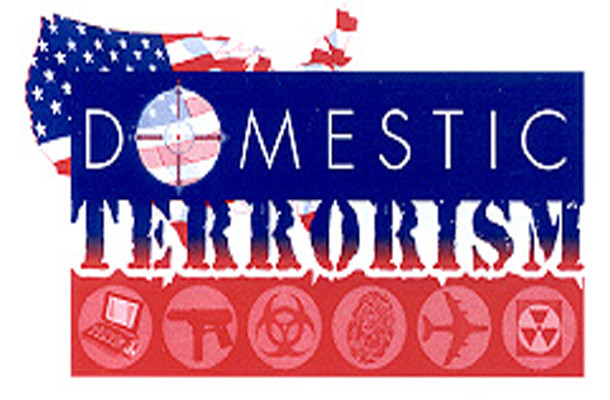There is a very, very narrow range under the law that applies to domestic terrorism where someone can actually be charged for terroristic offenses. It usually involves things like, did they use a weapon of mass destruction? So you could have a person committing an act of terrorism internationally, that is exactly the same as someone doing it domestically, and you're gonna get two completely different sets of charges.
實(shí)際上某人可以被指控犯有恐怖主義罪行,對其適用的國內(nèi)恐怖主義的法律范圍非常非常狹窄。通常涉及的問題包括,他們是否使用了大規(guī)模殺傷性武器?所以你可以讓一個(gè)人在國際上實(shí)施恐怖主義行為,這和在國內(nèi)從事恐怖主義行為的人是完全一樣的,你會(huì)受到兩種完全不同的指控。
Though there are varying definitions, under the federal U.S. criminal code, domestic terrorism is defined as, "acts dangerous to human life that are a violation of the criminal laws of the United States or of any state intended to intimidate the population and influence the government."
盡管對國內(nèi)恐怖主義有不同的定義,但根據(jù)美國聯(lián)邦刑法,國內(nèi)恐怖主義被定義為“危害人生命的行為,且違反了美國或任何州的刑法、意圖恐嚇人民和影響政府。”
Beirich says domestic terrorism legislation tends to be stronger at the state level than federal. While some politicians have called on the government to pass a domestic terrorism statute, other people say that would be federal overreach.
貝里奇說,國內(nèi)恐怖主義立法在州一級往往比聯(lián)邦一級更有力。盡管一些政界人士呼吁政府通過一項(xiàng)國內(nèi)恐怖主義法規(guī),但其他人表示,這將是聯(lián)邦政府的越權(quán)行為。
It's also important to note that different groups have different standards for tracking extremist violence. But no matter which way you look at it, data overwhelmingly show that white men are committing more acts of violent extremism in the U.S. than any other group. And it's on the rise.
同樣重要的是,要注意,不同的組織在追蹤極端主義暴力方面有不同的標(biāo)準(zhǔn)。但無論你怎么看,壓倒性的數(shù)據(jù)顯示,在美國,白人男性從事的暴力極端主義行為比任何其他群體都多。而且這一數(shù)字還在上升。

The number of hate groups in the U.S. have been ticking up in the last few years. White supremacist murders more than doubled from 2016 to 2017. Hate crimes also surged. And this hate has found a home online.
在過去幾年里,美國的仇恨組織數(shù)量一直在上升。從2016年到2017年,白人至上主義謀殺案增加了一倍多。仇恨犯罪也激增了。而這種仇恨在網(wǎng)上找到了根據(jù)地。
Major tech platforms including Google, Facebook, Twitter and YouTube have come under scrutiny over whether they're doing enough to monitor and block this hateful rhetoric. Increasingly, white supremacists with significant followings have been booted from the platforms, but tech companies also face pushback over whether those actions amount to censoring free speech.
谷歌、臉書、推特和油管等主要科技平臺(tái)在監(jiān)控和阻止這種仇恨言論方面做得是否足夠,這一點(diǎn)已經(jīng)受到了嚴(yán)格的審查。越來越多擁有大量追隨者的白人至上主義者被趕出了這些平臺(tái),但科技公司也面臨著阻力,不知道這些行動(dòng)是否相當(dāng)于審查言論自由。
Beirich says, this kind of thinking isn't likely to go away anytime soon, and that everyday citizens who want to combat this problem can write letters to tech companies and local representatives to lobby for increased oversight. But ultimately, she says, it's up to the government to track these movements more closely.
貝里奇說,這種想法不太可能很快消失,希望解決這一問題的普通市民可以寫信給科技公司和當(dāng)?shù)卮恚笃浼訌?qiáng)監(jiān)督。但她說,最終這取決于政府更密切地跟蹤這些運(yùn)動(dòng)。
White supremacy started with our constitution. It's part of our history. It's something we battled against for decades to get equal rights for people of color. And if we want to get rid of it, we're gonna have to defeat, we're gonna have first of all realize how dangerous it is, and then defeat that way of thinking here at home.
白人至上主義始于我們的憲法。這是我們歷史的一部分。我們幾十年來為爭取有色人種享有平等權(quán)利而與之斗爭。如果我們想要擺脫它,我們將不得不去戰(zhàn)勝,我們首先要意識(shí)到它有多危險(xiǎn),然后在內(nèi)部擊敗這種思維方式。
With all of this in mind, do you think the U.S. government should start taking domestic terrorism legislation more seriously? Let me know in the comments.
考慮到這一切,你認(rèn)為美國政府應(yīng)該開始更認(rèn)真地考慮國內(nèi)的恐怖主義立法嗎?請?jiān)谠u論中告訴我。












